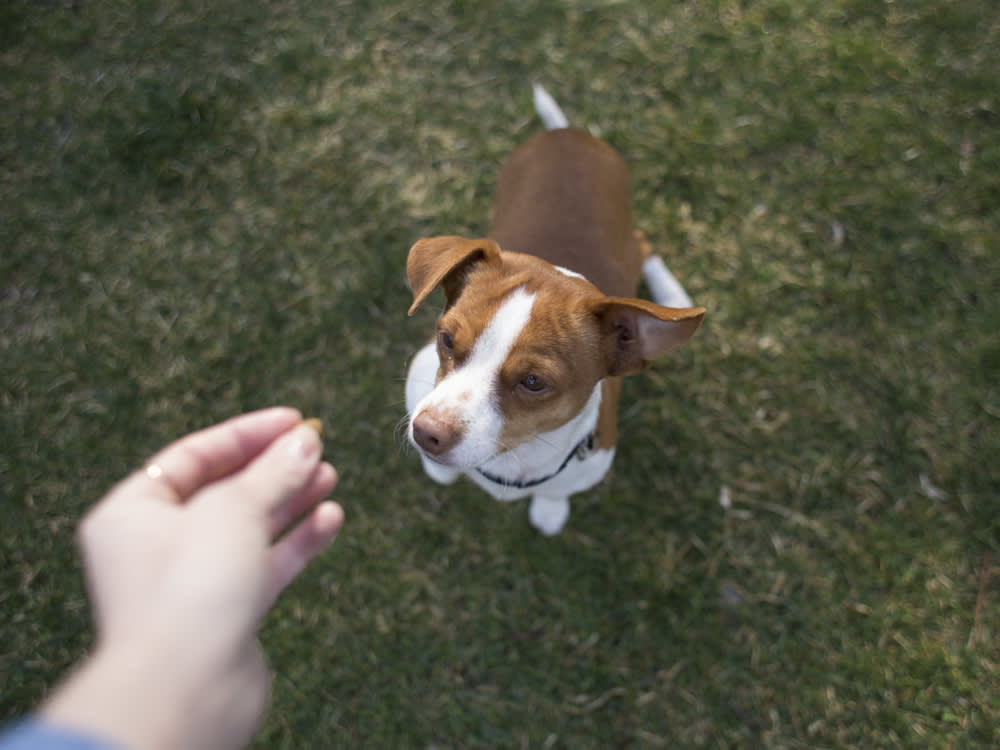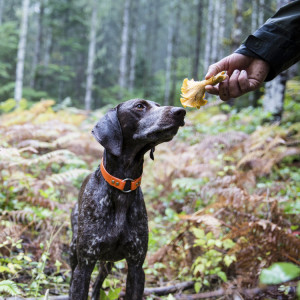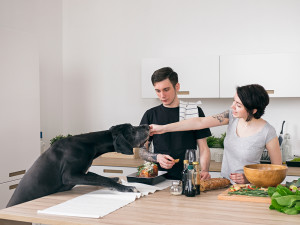Can Dogs Eat Almonds (and Other Nuts)?
This healthy snack for humans isn't so healthy for your pup. Here's why it's best to avoid them.

Share Article
Almonds are a healthy and satisfying snack for humans, but can you share them with your pup? Unfortunately, the consensus is probably not. While almonds aren’t necessarily toxic, they're difficult for dogs to digest, which is why they're on the list of foods it’s best for dogs to avoid (walnuts and macadamia nuts are also on the list). Keep reading for more reasons why your dog shouldn't consume almonds — plus, what to do if they accidentally eat some.
Nutrition facts: Almonds for dogs
Are almonds good for dogs?
Almonds pose many health and safety risks for dogs:
Choking hazards: Although in general, dogs are equipped to chew food in much the same way as humans, they don’t “nibble” almonds like we do. They’re more likely to swallow them whole. So there’s a chance that a nut can become lodged in their windpipe, and smaller-sized dogs are especially at risk.
Too salty: Snacking almonds are often heavily salted and seasoned, which causes us, and definitely, our dogs, to become very thirsty (think of those bowls of nuts so many bars generously provide for their customers). Too much salt can lead to water retention, which is especially dangerous for dogs with heart problems.
High in fat: Almonds are loaded with fat, which can contribute to a dog developing acute pancreatitis; fat also aggravates chronic pancreatitis.
High in phosphorus: The mineral can lead to bladder or kidney stones. Some breeds of dogs, such as the Yorkshire Terrier and Lhasa Apso, are genetically predisposed to kidney stones, and Shih Tzu, Miniature Schnauzer, and Bichon Frise are prone to bladder stones.
Can dogs eat almonds?
Your dog should not eat almonds. If you think your dog only ate a few almonds and they don't appear to be experiencing esophageal obstruction, monitor them for diarrhea or vomiting for twelve hours.
If your dog ate a big bag of almonds, take them to the vet immediately (especially if they’re a smaller dog). Your pup might require IV fluids for dehydration and drugs for pain management.

Are almonds completely safe for dogs?
No, almonds are not completely safe for dogs. However, they can consume almond milk and almond butter.
Almond milk is generally safe for your dog to drink, but it should only be served in moderation. Because almond milk is high in calories, some dogs might experience stomach issues, excess gas or diarrhea. Almond milk should only be given to dogs as a treat and in small quantities to prevent any potential digestive problems.
Dogs can eat almond butter but only in moderation and as long as there are no artificial sweeteners added. Carefully review ingredients to ensure that no toxic additives have been included. Xylitol, an artificial sweetener, can be found in several brands of almond butter, and it can cause dogs serious problems, including hypoglycemia, liver disease, and blood-clotting disorders. So if you give your dog almond butter, make sure xylitol isn’t one of the ingredients. Another thing to watch out for is digestion issues. While most brands of almond butter aren’t toxic to dogs, this nut spread is still high in fat which can cause stomach issues in some dogs. It’s a good idea to consult your veterinarian before giving your pup new foods.
If you give your dog peanut butter (and peanut butter treats), don't worry. These are fine for dogs because peanuts aren’t really a nut, but rather a legume. Still, it’s best not to give your dog individual peanuts, for many of the same reasons you should avoid giving them other types of nuts.
Other foods that are good for dogs
Peanut butter: Unlike almonds, peanut butter can make a great treatopens in new tab to add to you dog’s balanced diet.
Eggs: A protein powerhouseopens in new tab, eggs can be beneficial for dogs, too.
Corn: The kernels—not the cobs—are safe for dogsopens in new tab to eat.
Other foods that are not good for dogs
Pecans: Pecans are toxicopens in new tab to dogs and should never be given to them in any form.
Grapes: Dogs should under no circumstance eat grapes or raisins, which are highly toxic due to their tartaric acidopens in new tab.
Cashews: Though cashews aren’t toxic to dogs, their high-fat contentopens in new tab does mean that they should be avoided.
The bottom line: Can dogs eat human foods?
Certain human foods are safe for dogs to eat, though only in moderation. Almonds, though, should be avoided entirely.
FAQs (People also ask):
How many almonds can dogs eat?
Dogs should not eat any almonds.
Can dogs eat almonds?
No, dogs cannot eat almonds due to their saltiness and high-fat content.
Can dogs eat almond butter?
Yes, dogs can eat almond butter as long as there are no artificial sweeteners added, though only in moderation.
Can dogs drink almond milk?
Almond milk is generally safe for your dog to drink, but it should only be served in moderation.
References

Claudia Kawczynska
Claudia Kawczynska was co-founder and editor-in-chief of The Bark for 20 years. She also edited the best-selling anthology Dog Is My Co-Pilot.
Related articles
![Various Veggie Chips in a Ceramic Blue Bowl]()
Can Dogs Eat Sweet Potatoes?
Add it to the list of healthy human superfoods pups can eat, too.
![Puppy eating a bowl of blueberries]()
10 Superfoods You Should Share With Your New Dog
From kale to quinoa, these nutrient-packed picks deserve a spot in your dog’s food bowl.
![A dog sniffing a mushroom out of a hand.]()
6 Mushroom Superfoods that Won’t Turn Your Dog Into a Zombie
Nothing to fear here The Last of Us fans — ’shrooms are great immune-boosters.
![pet parents making homemade dog food cheaper for black dog climbing on counter]()
Is Cooking Your Dog’s Food Worth it?
A nutritionist on dogs’ unique dietary needs, important ingredients, and other pro tips for home-cooked dog food.




